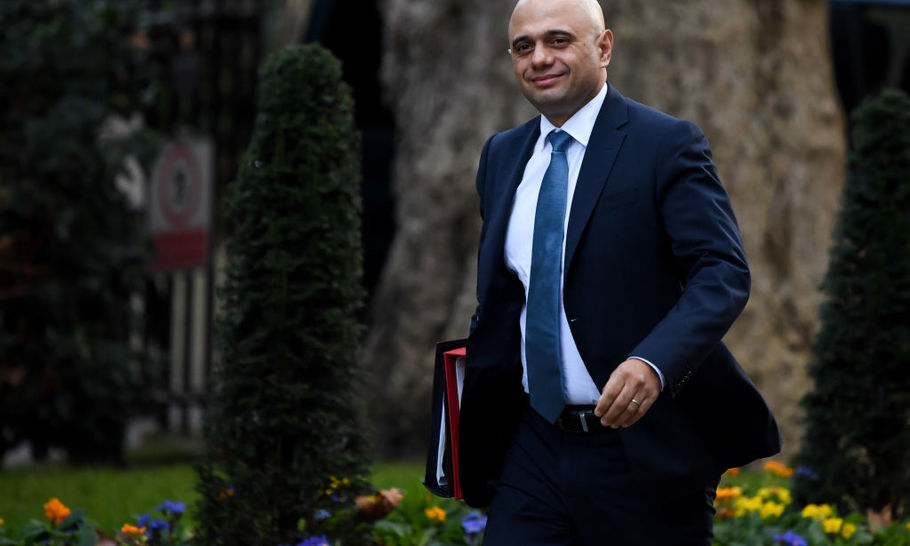Vote Leave's £350 million a week was the tip of the iceberg. EU membership actually costs us far, far more

Bloomberg via Getty Images
Sajid Javid’s speech to the Conservative Party Conference in Manchester this week got the most attention for an emotional reference at the start to his mother: “Twenty years ago, Mum thought it was a big deal when she watched the first Asians move into Coronation Street, here in Manchester. Well, now she’s watched as the first Asians move into Downing Street. Once again, we’re living above the shop… And I’m so happy to make her proud.” He lapsed briefly into Punjabi.
Of the announcements in his speech, it was spending on infrastructure and an increase in the minimum wage to £10.50 an hour by 2024 that caught the headlines. Less attention was given to a pledge which may have more lasting significance. He promised “a Brexit Red Tape Challenge” to identify EU regulations that should be removed or amended. His rhetoric about “liberating our entrepreneurs, small businesses and consumers from the burden of over-bearing bureaucracy, wherever we see it” was stirring but familiar.
The very phrase “Red Tape Challenge” was used for an exercise established by David Cameron and Nick Clegg in the years of Coalition Government. There was some modest snipping. House builders were assisted “by cutting down 100 overlapping and confusing standards”. But while these small, but commendable, efforts were underway, the EU regulations could not be touched – and they continued to accumulate.
The think-tank Open Europe has estimated that the top 100 EU regulations alone cost £33.3 billion annually. Just the top 100. Altogether there are 19,000 more.
For all the prominence given to the cost of our membership subscription to the EU, the much higher price is following all the rules. We all remember the debate about the slogan on the Vote Leave bus that our membership costs £350 million a week. It was pointed out that this was the gross figure, and that after the rebate it was a mere £250 million a week. The cost to us of EU regulation, at £640 million a week, got overlooked.
Not that scrapping regulations will necessarily avoid controversy. For example, last year the BBC reported: “European Court of Justice ruled that altering living things using the relatively new technique of genome editing counts as genetic engineering.” It added that “scientists who work in the areas of gene editing and genetic modification warned that the ruling would hold back cutting-edge research and innovation.” Gene editing could eradicate malaria. It involves making mosquitoes immune to the disease. Given that malaria is the largest killer of children in the world, allowing British scientists the chance to cure it is important. But genetic modification still has its critics.
Nor should it be assumed that being able to vary our arrangements will always mean reduced regulation. It has already been announced that after Brexit the export of live animals will be banned. Animal welfare is a higher priority for the British than those from other countries, so the law will reflect that.
But the causes of deregulation and animal welfare can go together. In 2006 the EU agreed a new regulation called Registration, Evaluation, Authorisation and Restriction of Chemicals. This has required – and continues to require – a huge amount of unnecessary animal testing at a cost of billions to the chemicals industry.
Other important changes could allow a more flexible labour market. The Working Time Directive is the EU regulation that bans working more than 48 hours a week. It is estimated it costs the British economy over £5 billion a year. It has been particularly damaging to the NHS as it has been applied to doctors who are “on call” through the night even if they were asleep. Patient care is harmed by the need to hand over from one doctor to another. The restriction should be lifted.
The Temporary Workers Directive, which requires equal treatment for temporary workers, has the impact of making temporary work harder to obtain.
EU regulations on financial services are estimated to cost over £7 billion. The Alternative Investment Fund Managers Directive and the Markets in Financial Instruments Directive might not be keenly discussed at the Dog and Duck. But the impact is significant for all of us in the way they hold back economic growth.
In some cases the regulation may be changed rather than scrapped. Some have argued, for example, that the rules on asbestos could be made more effective than currently allowed by the EU.
Or the motive for lifting a restriction could be that it is perverse. The EU’s Tobacco Products Directive restricts e-cigarettes. But many feel that vaping should be promoted as it is an effective way to encourage smokers to quit.
Self government will mean our politicians will have the power to decide which rules from the EU to scrap or change. It doesn’t mean that they will have the courage to do so. But many changes could be small and sensible that attract little fuss – an exemption for small business here, a simplification for charities there, a narrowing of the definition so it no longer applies to this or that product. Cumulatively the difference could end up being significant. This week, Javid could have started something big.





